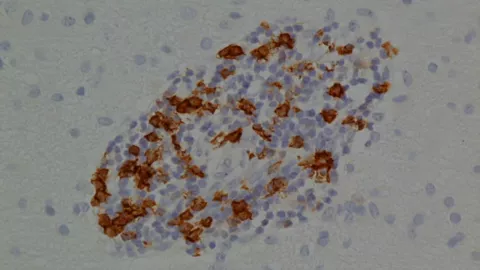
Targeting B cells to treat progressive MS
Lyndsey is a member of our research network. She recently spoke with Professor David Baker and Dr Klaus Schmierer from the Blizard Institute about their work on cladribine, a drug that targets B cells. Here's what they had to say.
A special type of immune cell - called a B cell - is the new kid on the block when it comes to treating MS. It’s hoped that targeting them can help in progressive MS as well as relapsing MS.
What are B cells?
The immune system is made up of many different cells that defend the body from danger. These include B cells and T cells which team up to fight infections.
The main job of T cells is to kill infected cells. B cells are a bit different. They protect us by creating antibodies which trap invading infections. Some B cells have other jobs. Like ‘memory’ B cells that hold a database of infections that the immune system has come across before.
What is their role in MS?
B cells are not normally found in the brain or spinal cord except during infections. But in MS, something goes wrong and triggers them to enter the brain when they're not needed. We used to think that B cells only caused damage by making antibodies that mistakenly target myelin – the protective coating around nerves.
But new research suggests that B cells can also directly activate T cells, summoning them into the brain where they can attack the myelin.
Do B cells cause progression in MS?
We know that when B cells enter the brain, they can live there for a long time, making more antibodies and new ‘memory’ B cells.
This can stimulate other cells in the brain to produce toxic substances, resulting in the cycle of damage we see in progressive MS.
Are there disease modifying therapies (DMTs) that can stop B cell damage?
Because we used to think that T cells were the major problem, DMTs often target those cells. But now we see that drugs targeting B cells are also effective.
A drug called ocrelizumab works by sticking to B cells and stopping them from getting into the brain and spinal cord. Ocrelizumab has shown some benefit for early primary progressive MS and is now available on the NHS.
We’re personally excited about cladribine. Cladribine works on B and T cells directly in the brain, rather than just in the blood. That means we can target the ‘memory’ B cells that live in the brain and hopefully reduce the cycle of inflammation.
What are your hopes for the future?
We’re keen to see if cladribine can help people who currently have no treatment options. In particular, we believe cladribine could slow progression and help arm and hand mobility for people who use wheelchairs.
Cladribine is already licensed for relapsing MS, but we need a clinical trial to show that it’s safe and effective for people with advanced MS.


